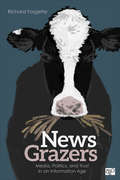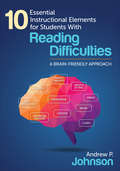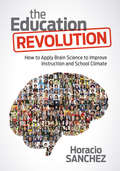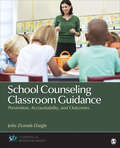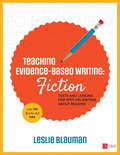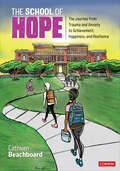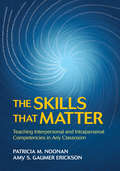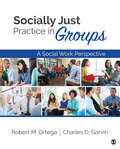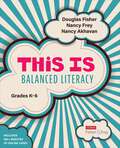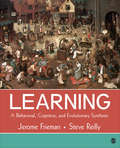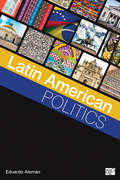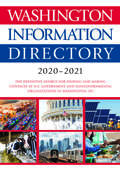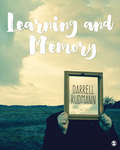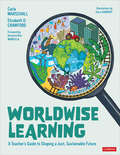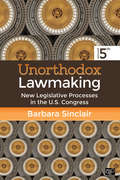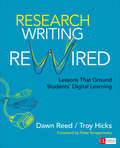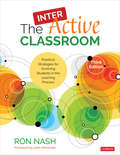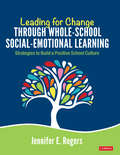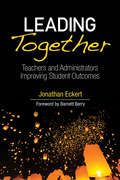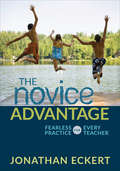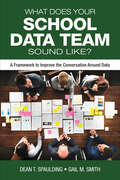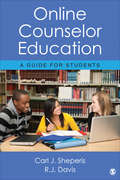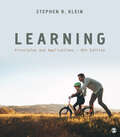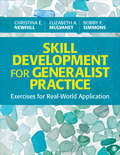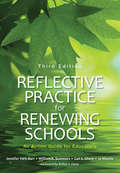- Table View
- List View
News Grazers: Media, Politics, and Trust in an Information Age
by Richard ForgetteHow has growing media choice transformed the way we gather news? News Grazers: Media, Politics, and Trust in an Information Age offers students an integration of the emerging effects that cable news, online news, and social media have had on American politics. Author Richard Forgette, an expert on the U.S. Congress and public policy, draws on direct experimental research to argue that the diffusion of media outlets and media technologies has resulted in an increasingly fragmented and distracted news audience. This unprecedented level of media choice is not only altering who accesses the news and how they do it; more important, it is changing the news itself. With chapters on commentary news, partisan news, breaking news, and fake news, News Grazers gives students the tools they need to critically analyze the ever-shifting media landscape. Special attention is also paid to the effects of the media and political trust on the 2016 election.
10 Essential Instructional Elements for Students With Reading Difficulties: A Brain-Friendly Approach
by Andrew P. JohnsonBrain-friendly strategies to help all students become lifelong readers Learning to read is more than just an educational issue; it’s a social justice issue. Did you know that struggling readers are twice as likely as their peers to drop out of high school? Through time-tested, research-based neurocognitive teaching strategies, 10 Essential Instructional Elements for Students with Reading Difficulties will enable you to hone readers’ skills and help students from all grade levels develop their ability to create meaning from print. Drawing from five key areas of neurocognitive research, Andrew Johnson provides a ten-point teaching strategy that encompasses vocabulary, fluency, comprehension, writing and more. A key resource for creating intervention plans for struggling readers, features include: Information on the often-overlooked importance of emotions in the process of overcoming reading struggles Strategies to promote voluntary reading, even for the most reluctant students Useful resources such as graphic organizers, additional reading and writing activities, and QR codes that link to videos Use these strategies today and you can count on more students leaving your classrooms as fluent, lifelong readers. "Dr. Johnson tells the story of reading in a logical and clear manner with a book that is excellently researched, immaculately referenced, and full of practical tips for the practitioner." Terry Bernstein, Former Senior Literacy Difficulties Specialist London Boroughs of Camden and Westminster, UK "This is the text I wish I had when I began to teach. Dr. Johnson clearly illustrates the process our brain uses to create meaning from text." Marty Duncan, Ed.D., Author and Former Educator
The Education Revolution: How to Apply Brain Science to Improve Instruction and School Climate
by Horacio SanchezMaximizing student capacity and restoring motivation—the key to school success Brain research has the power to revolutionize education, but it can be difficult for educators to implement innovative strategies without the proper knowledge or resources. The Education Revolution bridges the gap between neuroscience, psychology, and educational practice. It delivers what educators need: concrete applications of the most current and relevant research that they can use in their classrooms and schools. Readers will find Teaching strategies based on the latest brain research, designed to advance academic performance Scientifically sound, solution-focused practices to address the root of negative behaviors Approaches to counteract the negative impact of technology on the brain Concrete methods to improve school climate Model lessons for teachers that demonstrate how to implement the given strategies Written by Horacio Sanchez, a leading authority on child and adolescent behavior and resiliency, this book shows educators how they can use our growing understanding of brain science to restore students’ desire to learn; improve achievement, behavior and school climate; and revolutionize education. "Sanchez combines expertise in education, psychology, and neuroscience with extensive teaching experience and extraordinary insight into what makes us all behave the way we do." Dr. David L. Katz, President, American College of Lifestyle Medicine Director, Yale University Prevention Research Center "The Education Revolution focuses on the whole child through both academic and social aspects of learning. I feel confident that I can trust this research and use these ideas in my teaching." Kendra Hanzlik, Instructional Coach Prairie Hill Elementary School, College Community School District
School Counseling Classroom Guidance: Prevention, Accountability, and Outcomes (Counseling and Professional Identity)
by Jolie Ziomek-Daigle"Finally, a text that thoroughly covers the topic of classroom guidance – an effective tool for every school counselor at every school level." –Tiffany Bates, Louisiana Tech University Intended for school counselors to aid in the learning of developmental classroom guidance, School Counseling Classroom Guidance: Prevention, Accountability, and Outcomes teaches the fundamentals, strategies, and research outcomes of classroom guidance programming for comprehensive, developmentally appropriate school counseling programs. The content of this book looks at the history and fundamentals of classroom guidance, how these activities meet CACREP and ASCA standards, how and why activities should be aligned to the larger academic curriculum and state/national teaching standards, recommendations on how to develop and assess classroom guidance units, a sampling of units and lessons, techniques in managing the classroom, and outcome research and trends. School Counseling Classroom Guidance: Prevention, Accountability, and Outcomes is part of the Counseling and Professional Identity Series, which targets specific competencies identified by CACREP (Council for Accreditation of Counseling and Related Programs).
Teaching Evidence-Based Writing: Texts and Lessons for Spot-On Writing About Reading (Corwin Literacy)
by Leslie A. BlaumanOne in a million. Yes, that’s how rare it is to have so many write-about-reading strategies so beautifully put to use. Each year Leslie Blauman guides her students to become highly skilled at supporting their thinking about texts, and in Evidence-Based Writing: Fiction, she shares her win-win process. Leslie combed the ELA standards and all her favorite books and built a lesson structure you can use in two ways: with an entire text or with just the excerpts she’s included in the book. Addressing Evidence, Character, Theme, Point of View, Visuals, Words and Structure, each section includes: Lessons you can use as teacher demonstrations or for guided practice, with Best the Test tips on how to authentically teach the skills that show up on exams with the texts you teach. Prompt Pages serve as handy references, giving students the key questions to ask themselves as they read any text and consider how an author’s meaning and structure combine. Excerpts-to-Write About Pages feature carefully selected passages from novels, short stories, and picture books you already know and love and questions that require students to discover a text’s literal and deeper meanings. Write-About-Reading Templates scaffold students to think about a text efficiently by focusing on its critical literary elements or text structure demands and help them rehearse for more extensive responses. Writing Tasks invite students to transform their notes into a more developed paragraph or essay with sufficiently challenging tasks geared for grades 6-8. And best of all, your students gain a confidence in responding to complex texts and ideas that will serve them well in school, on tests, and in any situation when they are asked: What are you basing that on? Show me how you know.
The School of Hope: The Journey From Trauma and Anxiety to Achievement, Happiness, and Resilience
by Cathleen BeachboardDiscover how to improve achievement, happiness, and resilience using the science of hope The current mental health crisis is driving many teachers to leave the profession while students struggle with engagement and anxiety. Trauma-informed coping mechanisms are helpful, but this book goes a step further by incorporating much-needed but often-missing support to help learners feel hopeful and provide educators with resources to care for themselves. Based on research around the psychological science of hope, this guidebook provides strategies educators and school leaders can use daily to help students feel secure, build relationships, and improve academic outcomes. Included are practices and interventions that can be woven into classrooms and schools to foster mental wellness and happiness using Classroom materials, tools, and reproducibles Scientific resources to quickly assess and monitor hope Simple plans of action to improve hope, engagement, and motivation Vignettes from classrooms and the author’s own experiences with children who have experienced extreme trauma Backed by the latest research, The School of Hope will encourage higher academic attainment and equity, inspiring a sense of deeper fulfillment for both students and educators.
The Skills That Matter: Teaching Interpersonal and Intrapersonal Competencies in Any Classroom
by Patricia M. Noonan Amy S. EricksonBuild skills for lifelong success Many students leave high school without the skills they need to succeed in postsecondary education and the workforce. How can we better equip students for lifelong success? Research demonstrates that intrapersonal and interpersonal competencies impact student behavior and achievement, increase graduation rates, and promote strong post-school outcomes. The Skills That Matter provides middle and high school educators with the resources, tools, and practical examples to teach key intrapersonal and interpersonal competencies, including self-regulation, goal-setting, self-efficacy, assertiveness, and conflict management. Readers will find Competency-specific evidence-based instructional strategies with examples, and Tools such as sample instructional plans, formative assessments, and student-friendly products. This book provides teachers with the practical information they need to better develop socially and emotionally engaged, career-equipped, lifelong learners.
Socially Just Practice in Groups: A Social Work Perspective
by Charles D. Garvin Robert M. OrtegaSocially Just Practice in Groups: A Social Work Perspective comprehensively covers all aspects of group practice in social work settings, integrating a unique social justice framework throughout. Drawing from their experience as group work practitioners, authors Robert Ortega and Charles D. Garvin walk readers through the basics of group practice, including getting started, doing group work, establishing the purpose, roles and tasks of the group, stages and phases of practice, and specific skills in assessment, monitoring, and evaluation. A social justice framework provides a fresh perspective during an era of widespread social change and provides social workers tools for effective group interventions. Chapters contain detailed case examples to illustrate concepts presented, as well as exercises to help students practice skills.
This Is Balanced Literacy, Grades K-6 (Corwin Literacy)
by Douglas Fisher Nancy Frey Nancy AkhavanThis is Balanced Literacy: Grades K-6 Students learn to read and write best when their teachers balance literacy instruction. But how do you strike the right balance of skills and knowledge, reading and writing, small and whole group instruction, and direct and dialogic instruction, so that all students can learn to their maximum potential? The answer lies in the intentional design of learning activities, purposeful selection of instructional materials, evidence-based teaching methods, and in strategic groupings of students based on assessment data. Together, these create the perfect balance of high impact learning experiences that engage and excite learners. In this hands-on essential guide, best-selling authors Douglas Fisher, Nancy Frey, and Nancy Akhavan help you define that balance for your students, lighting the path to implementing balanced literacy in your classroom. Their plan empowers you to integrate evidence-based approaches that include: • Instructional materials comprised of both informational and narrative texts. • The best uses of instructional delivery modes, including direct and dialogic instruction. • Grouping patterns that work best to accomplish learning aims for different learners at different stages. • Instruction in foundational skills and meaning making, including oral language, phonemic awareness, phonics, fluency, vocabulary, comprehension, and writing. • Technology used as a tool for increasing learning of a specific literary process. All the tips and tools you need to realize the goal of balanced literacy learning are included, with classroom videos that show strategies in action. Tap your intuition, collaborate with your peers, and put the research-based strategies embedded in this roadmap to work in your classroom to implement or deepen a strong, successful balanced literacy program. Grow as a reading and writing teacher while leading your students to grow as readers and writers.
Learning: A Behavioral, Cognitive, and Evolutionary Synthesis (Psychology Ser.)
by Jerome Frieman Stephen ReillyLearning: A Behavioral, Cognitive, and Evolutionary Synthesis provides an integrated account of the psychological processes involved in learning and conditioning and their influence on human behavior. With a skillful blend of behavioral, cognitive, and evolutionary themes, the text explores various types of learning as adaptive specialization that evolved through natural selection. Robust pedagogy and relevant examples bring concepts to life in this unique and accessible approach to the field.
Latin American Politics
by Eduardo AlemanWhile it is true that poverty, political instability, and economic under-performance continue to be major problems in Latin America, the region has made substantial progress in raising standards of living and overcoming military authoritarianism. Latin American Politics reflects just how much the region has changed in the last two decades. Eduardo Alemán draws on contemporary research in comparative studies on institutions, elections, and public opinion to highlight the big questions that political scientists seek to answer today: What are the causes of political instability? What factors have influenced changes in economic and gender inequality? What are the implications of different political institutions for political outcomes?
Washington Information Directory 2020-2021 (Washington Information Directory)
by CQ PressThe Washington Information Directory (WID) is a topically organized reference resource that lists contact information for federal agencies and nongovernmental organizations in the Washington metro area along with a brief paragraph describing what each organization does related to that topic. In addition, WID pulls together 55 organization charts for federal agencies, congressional resources related to each chapter topic, hotline and contact information for various specific areas of interest (from Food Safety Resources to internships in Washington), and an extensive list of active congressional caucuses and contact details. WID has two appendices, one with thorough information on congresspersons and committees, and the second with governors and embassies.
Learning and Memory
by Darrell S. RudmannLearning and Memory provides students with a clear, balanced, and integrated presentation of major theoretical perspectives foundational to the study of human learning and memory. Author Darrell Rudmann uses an engaging personal writing style appropriate for students with little or no previous background in psychology to discuss topics including the major behaviorism theories of learning, modern cognitive theories of memory, social learning theories, the roles of emotion and motivation in learning, and the well-established neurological underpinnings of these perspectives. A concluding chapter on learning and memory concepts in the real world shows students to how these concepts are applied in various industries, from advertising to education and the media.
Worldwise Learning: A Teacher′s Guide to Shaping a Just, Sustainable Future (Corwin Teaching Essentials)
by Carla Marschall Elizabeth O. CrawfordNautilus Gold Award Winner (Books for a Better World) in Social Sciences & Education Create inclusive, democratic classrooms that prepare knowledgeable, compassionate, and engaged global citizens. Today’s global challenges—climate change, food and water insecurity, social and economic inequality, and a global pandemic—demand that educators prepare students to become compassionate, critical thinkers who can explore alternative futures. Their own, others’, and the planet’s well-being depend on it. Worldwise Learning presents a "Pedagogy for People, Planet, and Prosperity" that supports K-8 educators in nurturing "Worldwise Learners": students who both deeply understand and purposefully act when learning about global challenges. Coupling theory with practice, this book builds educators’ understanding of how curriculum and meaningful interdisciplinary learning can be organized around local, global, and intercultural issues, and provides a detailed framework for making those issues come alive in the classroom. Richly illustrated, each innovative chapter asserts a transformational approach to teaching and learning following an original three-part inquiry cycle, and includes: Practical classroom strategies to implement Worldwise Learning at the lesson level, along with tips for scaffolding students’ thinking. Images of student work and vignettes of learning experiences that help educators visualize authentic Worldwise Learning moments. Stories that spotlight Worldwise Learning in action from diverse student, teacher, and organization perspectives. An exemplar unit plan that illustrates how the planning process links to and can support teaching and learning about global challenges. QR codes that link to additional lesson and unit plans, educational resources, videos of strategies, and interviews with educators and thought leaders on a companion website, where teachers can discuss topics and share ideas with each other. Worldwise Learning turns students into local and global citizens who feel genuine concern for the world around them, living their learning with intention and purpose. The time is now.
Unorthodox Lawmaking: New Legislative Processes in the U.S. Congress
by Barbara L. Sinclair"Barbara Sinclair does an excellent job of showing how contemporary lawmaking departs from the traditional legislative process. I can′t imagine teaching a course on Congress without this text—it’s absolutely indispensable." —Philip Klinkner, Hamilton College Most major measures wind their way through the contemporary Congress in what Barbara Sinclair has dubbed "unorthodox lawmaking." In this much-anticipated Fifth Edition of Unorthodox Lawmaking, Sinclair explores the full range of special procedures and processes that make up Congress’s work, as well as the reasons these unconventional routes evolved. The author introduces students to the intricacies of Congress and provides the tools to assess the relative successes and limitations of the legislative process. This dramatically revised Fifth Edition incorporates a wealth of new cases and examples to illustrate the changes occurring in congressional process. Two entirely new case study chapters highlight Sinclair’s fresh analysis and the book is now introduced by a new foreword from noted scholar and teacher, Bruce I. Oppenheimer, reflecting on this book and Barbara Sinclair’s significant mark on the study of Congress.
Research Writing Rewired: Lessons That Ground Students’ Digital Learning (Corwin Literacy)
by Dawn M. Reed Troy W. HicksOur students are online constantly, and yet research shows that only half of teachers say digital tools make writing instruction easier. Research Writing Rewired seeks to turn that statistic upside down. Or, rather, upside right: If we want to ready students for a globalized world, 100% of teachers ought to consider technology an asset to any kind of writing, assert authors Dawn Reed and Troy Hicks. But the "main wiring" still has to be the ELA standards and the essential questions at the heart of each content area. To that end, the authors show you how to use digital tools within a multi-week inquiry unit to increase students’ engagement as they write-to-learn and share knowledge. Their book a clear model for tech-rich research writing that will inform your own inquiry-driven units. Guiding components include: An inquiry-based, technology-rich unit on identity and culture that provides learners with opportunities to engage with the very same issues that are written about and discussed by citizens of a global society 28 model lessons and a framework including extensions, tech tips, and activities that blend print, image, apps, and video so students build multi-literacy skills day by day Recurring use of best practices like formative assessment, close reading, think alouds and teaching key skills, including analyzing and synthesizing, annotating, checking credibility of sources, discussion, and writing about reading Dozens of lessons and activities built around students’ favorite technology tools and online destinations, including: Citelighter, Smore, ThingLink, Padlet, and Cazles, Animoto, Mural.ly, and getLoupe, Genius and Lit Genius, Now Comment, You Voices QR codes that take you to video clips on a companion website, so you can see the teaching techniques and digital tools in action It’s up to us to make the digital learning in school a lot more like the digital learning we all do in life. Research Writing Rewired shows us how to channel students’ passion for digital communication into meeting ELA goals.
The InterActive Classroom: Practical Strategies for Involving Students in the Learning Process
by Ron NashShift Students’ Roles from Passive Observers to Active Participants. Preparing students for a world that did not exist when they were students themselves can be challenging for many teachers. Engaging students, particularly disinterested ones, in the learning process is no easy task, especially when easy access to information is at an all-time high. How then do educators simultaneously ensure knowledge acquisition and engagement? Ron Nash encourages teachers to embrace an interactive classroom by rethinking their role as information givers. The Interactive Classroom provides a framework for how to influence the learning process and increase student participation by sharing • Proven strategies for improving presentation and facilitation skills • Kinesthetic, interpersonal, and classroom management methods • Brain-based teaching strategies that promote active learning • Project-based learning and formative assessment techniques that promote a robust learning environment Intended to cultivate an interactive classroom in which students take an active role in learning, this book provides a blueprint for educators seeking to amplify student engagement while imparting critical twenty-first century skills.
Leading for Change Through Whole-School Social-Emotional Learning: Strategies to Build a Positive School Culture
by Jennifer E RogersDevelop and cultivate a positive school culture! Calling all change agents! If you are hoping to join other schools and districts across the country that are adopting Social-Emotional Learning (SEL) programs and practices to improve student outcomes and teacher capacity, then you’ve found the right book. Let Jennifer Rogers share her specialized experience in developing and implementing behavioral and social-emotional programs and support with you. The practical framework outlined in this book comprises real-world experiences and evidence-based strategies to integrate systemic change toward a positive school culture. With sustainable practices in mind, this guide features thought-provoking worksheets to explore staff understanding of SEL, collect evidence, influence instruction, and more a step-by-step rubric to guide implementation with recommendations resources to explore at the end of each chapter reflection questions to promote deeper thinking SEL is about both prevention and intervention. For the stakeholders engaged in this work who must think reflectively about schools, this book offers the support, strategies, processes, and tools, to teach students these competencies in a comprehensive and sustainable way.
Leading Together: Teachers and Administrators Improving Student Outcomes
by Jonathan EckertIt’s about the work, not the position. Leadership is what is done, not who is doing it. The leadership work blurs the lines between teachers and administrators. Leading Together introduces a collective approach to progress, process, and programs to help build the conditions in which strong leadership can flourish and student outcomes improve. All school teams will find applicable insights as they explore the Collective Leadership Development Model for School Improvement. This book: ? Breaks down this innovative model and explains the significance and interdependence of each proven and tested component. ? Asks fearless reflection questions that both challenge and demand deliberate practice. ? Offers case study insights from an urban, rural, and suburban school. Lead and learn together. Start building your team with an eye on the end game. "Leading Together is the best guidance we have to date about how to collaboratively dismantle the wall that has stood between teachers and school administrators for over a century. This is a marvelously accessible book in which collective leadership is discovered through the eyes and voices of teachers and principals." Joseph F. Murphy, Frank W. Mayborn Chair and Associate Dean Peabody College of Education, Vanderbilt University, Nashville, TN "Leading Together includes rich research-based stories, reflective activities to spark action, and optimistic evidence about what this needed shift in school hierarchies means for improving student outcomes. Don’t just read this; adopt it as your guidebook to become an even more influential leader." P. Ann Byrd, COO & Partner Center for Teaching Quality, Carrboro, NC "Once again, Jon Eckert offers his straightforward, no nonsense thinking to busy practitioners. His authentic knowledge of everyday life in schools coupled with a thoughtful framework informs every chapter in this book. There are elements of his model that can be used right away...big shifts or little tweaks! His stories and humor make it readable (and meaningful!) for those of us seeking creative and collaborative ways to lead schools and districts." Joan Dabrowski, Assistant Superintendent for Teaching and Learning Wellesley Public Schools, Wellesley, MA
The Novice Advantage: Fearless Practice for Every Teacher (Corwin Teaching Essentials)
by Jonathan EckertCapture the novice mindset! Get ready to teach as never before, powered by a fresh, brave mindset. With humor and insight, this down-to-earth guide reveals a fundamental principle: the best teachers grow through risk, reflection, and revision. Readers will learn how to: Sustain the energy and positive qualities of a novice, while building expertise at all career stages Develop a network of support to improve teaching practice Implement new strategies that engage and motivate students Learn how to teach with the daring of a beginner and a lifelong passion for learning and growth. "Dr. Eckert highlights the value of seeking those "first days" throughout our careers – the joy and nervousness experienced in these transformational moments are critical to have again and again if we are to grow personally and professionally." Patrick Ledesma, Director of Research and Knowledge Management National Board for Professional Teaching Standards
What Does Your School Data Team Sound Like?: A Framework to Improve the Conversation Around Data
by Dean T. Spaulding Gail M. SmithGet your data team working effectively! Data is a valuable resource for improving education. Unfortunately, many school teams struggle to make sense of new and often overwhelming data. What Does Your Data Team Sound Like? provides an approach that supports teams as they review a range of data sets, and improves their conversation about effectively applying data to instructional decision-making. Written to help teams navigate the world of data analysis for on-going school improvement, this book offers an easy to follow framework that dives deep into data-driven instruction. Readers will find: Easy, step-by-step analysis techniques Case studies that demonstrate different approaches Checklists and flowcharts to help visual the process Developed by expert authors who have worked with data teams across a wide variety of settings and scenarios, this book will help educators take action to create better learning environments for students.
Online Counselor Education: A Guide for Students
by Carl J. Sheperis R. J. DavisOnline Counselor Education: A Guide for Students is an all-new guide for online students in counselor education programs. Students in online environments face a number of challenges that could put them at a disadvantage unless they have a resource to help guide them through some of the confusing aspects of an online environment. Such challenges include the lack of understanding surrounding graduate school performance expectations, balancing graduate school and life, the inability to connect with community members and local field agencies, and various other aspects unique to an online environment. This text will help students through these challenges and act as an invaluable resource.
Learning: Principles and Applications
by Stephen B. KleinLearning: Principles and Applications provides students a current, comprehensive, and engaging introduction to the psychology of learning. Praised for its easy-to-read style and presentation of important contributions of both human and nonhuman animal research, the text helps readers understand the process of learning with coverage of classic experiments, contemporary research, real-world examples, applications, chapter-opening vignettes, and critical thinking questions. The Eighth Edition features expanded sections on theories of conditioning, a streamlined organization through two separate chapters on memory storage and retrieval, and enhanced pedagogy to better connect the material to the everyday lives of students.
Skill Development for Generalist Practice: Exercises for Real-World Application
by Christina E. Newhill Elizabeth A. Mulvaney Bobby F. SimmonsSkill Development for Generalist Practice offers an array of competency-building exercises addressing foundational social work knowledge as well as skills and values across micro, mezzo, and macro levels of practice. Designed to be actively used during class time, exercises embrace the diverse range of clients encountered by social workers in various practice settings and reflect a commitment to serving those who are the most vulnerable, at risk, disadvantaged, and marginalized from society.
Reflective Practice for Renewing Schools: An Action Guide for Educators
by William A. Sommers Joanne K. Montie Jennifer York-Barr Gail S. GhereRenew your teaching and your passion with this updated bestseller! The teaching life can be hectic, complex, and even lonely. That’s why so many educators turn to reflective practice to reenergize their commitment to students—and to themselves. Reflective practice counteracts the effects of professional isolation and instills a personal and communal sense of meaning, renewal, and empowerment. This best-selling book offers research-based and practical ideas and strategies for using reflective practice individually, with colleagues, schoolwide, and even district-wide. Features of the newest edition include: Updated strategies for engaging adults and students and using reflective practices to create equitable outcomes New examples of reflective practice in action A new chapter on the core leadership practices for growing reflective practice A new companion website with resources and reflection protocols When you make reflective practice part of your journey as an educator, your insights benefit everyone—and ensure enhanced learning and development for students. "This book is one of the best in the field. It lends itself to practical solutions if the reader remembers that the gifts of time and relationships are at the center of this work. The book takes a lot of theory and melts it down to hands-on pieces doable in a school or district setting." —Michele R. Dean, Coordinator, Ventura County Indian Education Consortium Ventura Unified School District, CA "The book has broken down reflection into its component parts, cycles, characteristics, and capacities. I applaud the insights and experiences of the authors." —Pat Roy, Senior Consultant Learning Forward
